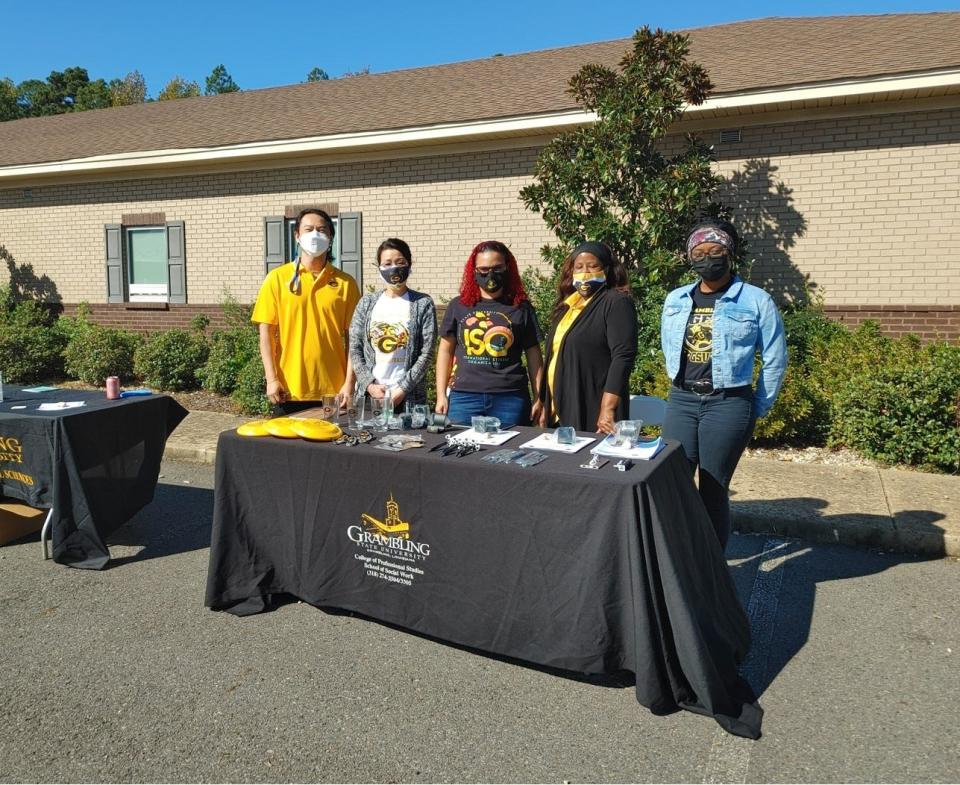Social workers play key role North Louisiana COVID-19 research project
The COVID-19 sequencing research project in North Louisiana, a partnership between Grambling State University, LSU Health Shreveport and Louisiana Tech University, is a large, comprehensive one — but not just medical doctors and researchers are involved.
Rather, the mission to track how COVID spreads and evolves in the region, a critical part of the research, requires the help of social workers.
The idea to incorporate social work into this medical research project came up when researchers decided they wanted to get the community involved. Instead of taking positive COVID samples without patient consent, a common practice, Paul Kim, associate professor of biological sciences at Grambling, said he wanted community members to agree to what was being done with their COVID swab. However, in order to get North Louisianans on board, Kim said they wanted to bring in Grambling's social work department, who are experts in engaging and building rapport with people.
More: La. Tech, Grambling, LSU Health Shreveport are partnering to learn how COVID-19 is spreading
Of the three partners, Grambling is the only institution with a dedicated social work program. Through this partnership, Grambling's social work team helps prospective research participants understand the project, disseminates health information on various topics and facilitates resource opportunities, such as a food drive, to give back to those in need. In doing so, the team aims to decrease disparities in access to healthcare, healthcare information and other resources.

"Participants, they might be more willing to be a part of the research to donate their specimen if they understand what it's about," Kim said. "To do that, you have to engage people, and so I wanted to leverage what we have in our social work department because they're there. They work with the community, and they're trusted in the community."
More: Ouachita Parish Schools employees excited about pay boost
Since the start of the pandemic, trust in public health has dwindled with the perception of ever-changing messages about proper COVID-prevention protocol, Kim said, so he figured locals would be more likely to trust someone from Grambling State University versus the Centers for Disease Control and Prevention.
However, Elise Reed, assistant professor and director for Grambling's School of Social Work, said distrust between Black Americans and medicine did not begin in 2020. For example, the Tuskegee Experiment, which dates back to 1932, was an unethical study on Black men and syphilis run by doctors from the U.S. Public Health Service in which the doctors purposefully withheld care from patients. As a result, Black men experienced severe health problems and many died.
Today, health disparities continue for disadvantaged populations, including the Black community. Reed said there are disproportionately higher numbers of Black Americans who experience health issues, such as COVID and heart disease.
More: Parents seeking info on the COVID-19 vaccine for kids sometimes lack access to pediatricians
"Part of us that's so good about us being a part of this team is that we are in the communities, that we live in the community that we are reaching out to," Reed said. "Just to have that echo to say, 'Hey, this is OK. This is going to help us; this is going to improve medical outcomes and hopefully eradicate health disparities as it relates to COVID-19.'"
Throughout the course of this partnership, the social work department has helped facilitate a food drive, a health forum during Grambling's homecoming week and a health fair at Serenity Springs. At the health forum, Reed said organizations like the National Alliance on Mental Illness handed out resources and information brochures for folks to take home.
With these events, Reed said they are able to build partnerships with more institutions, whose resources they can connect back to the people in the community.
"What I like about how we were able to participate in that food drive is we're not just taking from people like, 'Give us your virus. We just want your data,'" Kim said. "We want to give back, and we were helping meet some of their basic needs — information but also sustenance."
More: COVID-19 in schools: See the parishes leading Louisiana in K-12 infections as of Nov. 24
Those interested in partnering with the research project, either clinics or businesses, should contact the research team at nla-health.com/contact.html.
Gayberyl Wesley, assistant professor for Grambling's social work department, said folks should continue to test for COVID even if they are vaccinated. The more people who decide to get tested as part of the North Louisiana research project, the more data researchers will have to be able to analyze how the virus is spreading and possibly mutating in the region.
"Help us find out where are these different strands are coming from because there's new variants that are coming out," Wesley said. "Hopefully, we will be able to play a part in helping to encourage other people to to get tested, even if you're vaccinated."
Follow Sabrina LeBoeuf on Twitter @_sabrinakaye and on Facebook at https://bit.ly/3B8sgHo.
Support local journalism by subscribing at https://cm.thenewsstar.com/specialoffer.
This article originally appeared on Monroe News-Star: Social workers play key role in community outreach for COVID research

